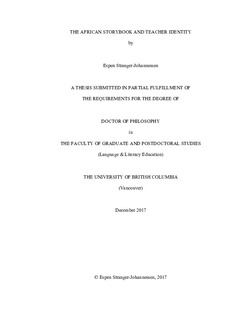| dc.description.abstract | The African Storybook (ASb) is a digital initiative that promotes multilingual literacy for African children by providing openly licenced children’s stories in multiple African languages, as well as English, French, and Portuguese. One of the ASb pilot sites, a primary school in Uganda, served as the focal case in this research, while two other schools and libraries were also included. Data was collected from June to December 2014 in the form of field notes, classroom observations, interview transcripts, and questionnaires, which were coded using retroductive coding. Based on Darvin and Norton’s (2015) model of identity and investment, and drawing on the Douglas Fir Group’s (2016) framework for second language acquisition, this study investigates Ugandan primary school teachers’ investment in the ASb and how their identities change through the process of using the stories and technology provided by the ASb. The findings indicate that the use of stories expands the repertoire of teaching methods and topics, and that this use is influenced by teachers’ social capital as well as financial factors and policies. Through the ASb initiative and its stories, the teachers began to imagine themselves as writers and translators; change agents; multimodal, multiliterate educators; and digital educators, reframing what it means to be a reading teacher. Teachers’ shifts of identity were indexical of their enhanced social and cultural capital as they engaged with the ASb, notwithstanding ideological constraints associated with mother tongue usage, assessment practices, and teacher supervision. This exploration of teachers’ resourcefulness, needs, and realities provides a foundation for enhancing existing practices. | nb_NO |

